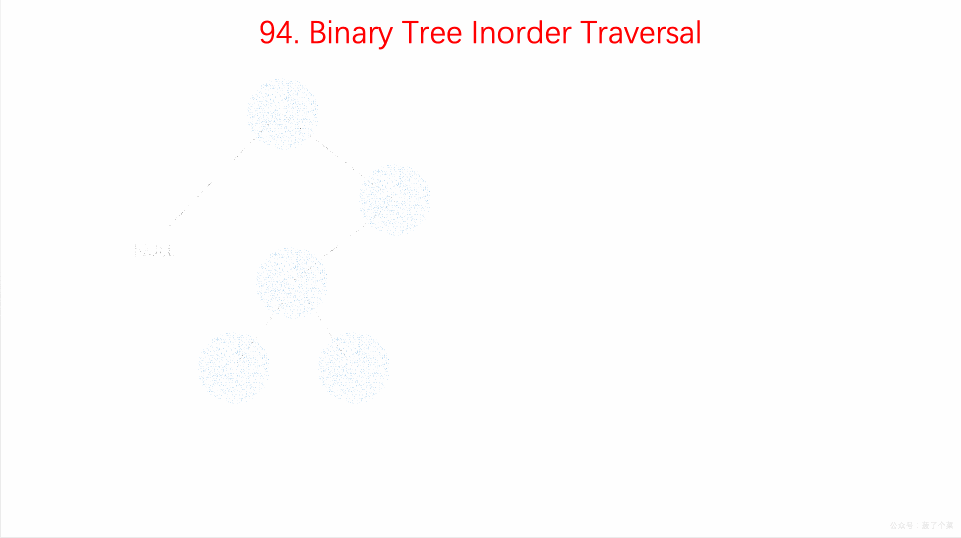https://leetcode.com/problems/binary-tree-inorder-traversal/description/
Given a binary tree, return the inorder traversal of its nodes' values.
Example:
Input: [1,null,2,3]
1
\
2
/
3
Output: [1,3,2]
Follow up: Recursive solution is trivial, could you do it iteratively?
递归的方式相对简单,非递归的方式借助栈这种数据结构实现起来会相对轻松。
如果采用非递归,可以用栈(Stack)的思路来处理问题。
中序遍历的顺序为左-根-右,具体算法为:
-
从根节点开始,先将根节点压入栈
-
然后再将其所有左子结点压入栈,取出栈顶节点,保存节点值
-
再将当前指针移到其右子节点上,若存在右子节点,则在下次循环时又可将其所有左子结点压入栈中, 重复上步骤
(图片来自: https://github.com/MisterBooo/LeetCodeAnimation)
- 二叉树的基本操作(遍历)
不同的遍历算法差异还是蛮大的
-
如果非递归的话利用栈来简化操作
-
如果数据规模不大的话,建议使用递归
-
递归的问题需要注意两点,一个是终止条件,一个如何缩小规模
-
终止条件,自然是当前这个元素是null(链表也是一样)
-
由于二叉树本身就是一个递归结构, 每次处理一个子树其实就是缩小了规模, 难点在于如何合并结果,这里的合并结果其实就是
left.concat(mid).concat(right), mid是一个具体的节点,left和right递归求出即可
/*
* @lc app=leetcode id=94 lang=javascript
*
* [94] Binary Tree Inorder Traversal
*
* https://leetcode.com/problems/binary-tree-inorder-traversal/description/
*
* algorithms
* Medium (55.22%)
* Total Accepted: 422.4K
* Total Submissions: 762.1K
* Testcase Example: '[1,null,2,3]'
*
* Given a binary tree, return the inorder traversal of its nodes' values.
*
* Example:
*
*
* Input: [1,null,2,3]
* 1
* \
* 2
* /
* 3
*
* Output: [1,3,2]
*
* Follow up: Recursive solution is trivial, could you do it iteratively?
*
*/
/**
* Definition for a binary tree node.
* function TreeNode(val) {
* this.val = val;
* this.left = this.right = null;
* }
*/
/**
* @param {TreeNode} root
* @return {number[]}
*/
var inorderTraversal = function(root) {
// 1. Recursive solution
// if (!root) return [];
// const left = root.left ? inorderTraversal(root.left) : [];
// const right = root.right ? inorderTraversal(root.right) : [];
// return left.concat([root.val]).concat(right);
// 2. iterative solutuon
if (!root) return [];
const stack = [root];
const ret = [];
let left = root.left;
let item = null; // stack 中弹出的当前项
while(left) {
stack.push(left);
left = left.left;
}
while(item = stack.pop()) {
ret.push(item.val);
let t = item.right;
while(t) {
stack.push(t);
t = t.left;
}
}
return ret;
};